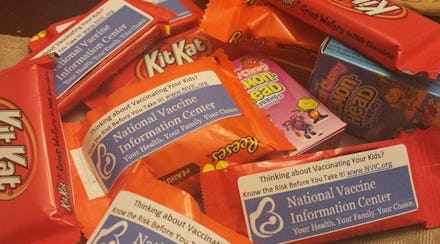Would You Like Some Anti-Vaccine Propaganda With Your Halloween Candy?

The news: It should be common knowledge by now: Vaccines are important. But apparently that's not what the fake-sounding, yet very real, National Vaccine Information Center thinks.
The group's latest target is Halloween candy. The NVIC posted a picture on Facebook of DIY label stickers that can be conveniently placed on kids' candy to both spread propaganda and ruin Halloween for innocent kids.
The reaction: The post was immediately bombarded by people informing the group that they're stupid and this idea is stupid. One of the top comments was "Halloween isn't a political platform. Stop trying to ruin it for people. 'Hey, this is a great time to impose my anti-government-propaganda-fueled-views on school children and their families.' No, it's not."
They're right. The National Vaccine Information Center sounds like a sham agency because it is one. Respectful Insolence writes that NVIC's website "is chock-full of anti-vaccine misinformation and fear-mongering."
The group was also the focus of a Slate piece that disproved the NVIC's main talking point, that vaccines cause autism. "They go on and on about 'vaccine injuries,' yet actual severe side effects from vaccines are very rare especially when you realize that many millions of vaccines are given every year," Slate wrote.
The facts: While a "fun sticker-ing campaign" might seem like a good way to spread your (incorrect) message, it's going to run into problems when it has to tackle one glaring obstacle: the truth.
Last year, the NVIC unleashed a misleading billboard campaign that aimed to "encourage well-informed vaccine decision-making." The campaign pointed people to a website that only highlighted the "risks and failures" of vaccines, rather than the benefits, which strongly outweigh the negatives. Information like how often the side effects occur, or even whether they're common, was left off the website, a tactic labeled as "dishonest" by its critics.
NVIC's falsehoods are part of a broader pack of lies commonly told by anti-vaccination believers. They often allege that vaccines are filled with dangerous toxins or that too many vaccines can harm a child's immune system — all of which has been disproven by science.
The anti-vaxx movement is also making America's children less safe and more susceptible to sickness, as demonstrated by a marked rise in numerous diseases that had previously been all but eradicated.
In one instance, the anti-vaccination movement has "been linked to this measles resurgence due to the fact that communities with low rates of immunization are more at risk of a contagious outbreak." An easy-to-administer measles vaccine is a simple solution to this problem.
In another example, the CDC shows that diseases' morbidity rate are drastically cut down because of the "efficacy of vaccines."
Granted, no vaccine is 100% effective, but some can get pretty close. They're still a "crucial component of maintaining 'herd immunity,' which is the idea that if the majority of a population is inoculated, it can stop chains of infection." In return, you're less likely to get a disease if others around you are vaccinated.
And that's a very good thing, NVIC.